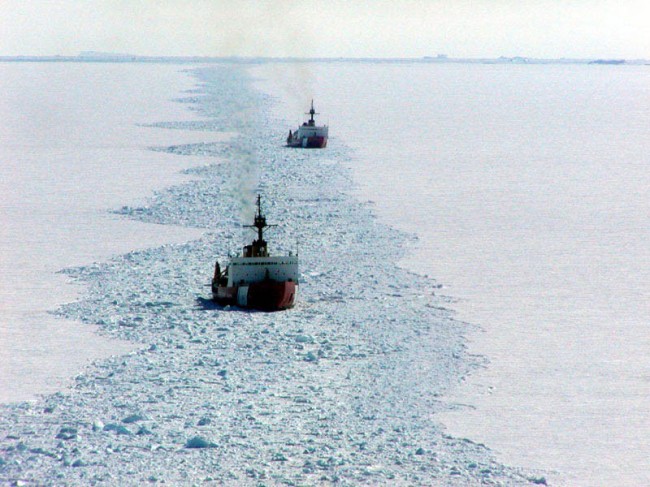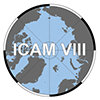|
|
|
|
|
|
|
|
2018 DOD Arctic Science & Technology Synchronization Workshop, May 16-18, 2018 (Hanover, NH). The 2018 Arctic Science & Technology Synchronization Workshop will be sponsored jointly by Northern American Aerospace (NORAD) US Northern Command (USNORTHCOM) and USD(R&E) to help represent Department of Defense-wide science and technology with Arctic relevance. The event organizers aim for in-depth discussions of military-relevant Arctic S&T and policy, and would like to emerge with a stronger sense of potential requirements for Arctic S&T work as well as strengthened connections for DOD communities, including operational communities, who work in Arctic conditions and conduct research related to them. In-person registration has reached its capacity and is closed.
|
Media
Hope and Mourning in the Anthropocene: Understanding Ecological Grief. We are living in a time of extraordinary ecological loss. Not only are human actions destabilising the very conditions that sustain life, but it is also increasingly clear that we are pushing the Earth into an entirely new geological era, often described as the Anthropocene. Research shows that people increasingly feel the effects of these planetary changes and associated ecological losses in their daily lives, and that these changes present significant direct and indirect threats to mental health and well-being. The Conversation
 Arctic Ice is Getting 'Younger.' But That's Not Healthier. Arctic Ice is Getting 'Younger.' But That's Not Healthier. In the Arctic Ocean, some ice stays frozen year-round, lasting more than a decade before melting. This multiyear ice is considered one way to determine the region's climate health, because older ice tends to be thicker and more resistant to melting. But this winter, the region hit a record low for ice older than five years. New York Times
The Breathtaking Views From Operation Icebridge Revealed: NASA Shares Incredible Images as it Completes Latest Mission to Map the Arctic. NASA has revealed stunning images of the Arctic after completing the latest leg of it's 10 year mission Operation IceBridge, making the flights over in Greenland and Antarctica in an effort to map the remote regions' land and sea ice and predict its response to climate change. The recent campaign began March 22 and finished on May 2. Daily Mail
|
|
Future Events
** New this week ** Arctic Indigenous Scholars Seminar with Rosemary Ahtuangaruak & Theresa Arevgaq John, May 23, 2018 (Washington, DC USA and webinar). This event is part of the Arctic Research Consortium of the United States Arctic Research Seminar Series and the Empowering Arctic Indigenous Scholars and Making Connections program. The Empowering Arctic Indigenous Scholars and Making Connections program creates space for indigenous scholars to educate and inform policy- and decision-makers engaged in Arctic issues while visiting Washington, DC, and provides a platform for traditional knowledge holders to share their expertise with the wider Arctic research community.
** New this week **
This half-day program will focus on the capabilities of the EarthScope Transportable Array and the impact it is having on scientific research and operational monitoring in areas as diverse as earthquakes, weather forecasting, volcanoes, tsunamis, and ecosystems. The hosts are particularly interested in exploring inter-agency / multi-agency interests and opportunities for how the Transportable Array observing capability can be used, particularly with respect to the compatibility of different observing interests. The National Science Foundation has committed only to a short duration deployment but is open to broadening the application to other science observations for longer durations, if the obligation to remove the stations is shared or undertaken by other stakeholders.
- Addressing the energy field of the future;
- Defense energy systems in the North;
- Natural hazards and aerospace/defense;
- Empowering Alaska's entrepreneurs;
- Navigating the changing Arctic; and,
- Developing local and global energy solutions.
The Effects of Climate Change on the World's Oceans, June 4-8, 2018 (Washington, DC USA). The 4th International Symposium will bring together experts from around the world to better understand climate impacts on ocean ecosystems - and how to respond. The event is hosted by a variety of groups including International Council for the Exploration of the Sea (ICES), N. Pacific Marine Science Organization (PICES), Intergovernmental Oceanographic Commission of UNESCO (IOC), and Food and Agriculture Organization of the United Nations (FAO).
Vision on Marine Infrastructure, June 11, 2018, 1:00-3:00 pm (Washington, DC
).
The U.S. Committee on the Marine Transportation System and its Marine Transportation System Federal partners will share their visions and priorities on maritime infrastructure, which refers to physical infrastructure, informational infrastructure (such as aids to navigation, nautical charts, and real-time meteorological and oceanographic services), and mariner needs. Open to the public, but RSVP is required to access the location. Please contact Jaya.Ghosh@cmts.gov by June 6, 2018 to RSVP. See here
for additional details.
 POLAR 2018, June 15-27, 2018 (Davos, Switzerland). POLAR2018 is a joint event from the Scientific Committee on Antarctic Research (SCAR) and the International Arctic Science Committee (IASC). The SCAR meetings, the ASSW and the Open Science Conference will be hosted by the Swiss Federal Institute for Forest, Snow and Landscape Research WSL under the patronage of the Swiss Committee on Polar and High Altitude Research. The WSL Institute for Snow and Avalanche Research SLF is organizing POLAR2018. POLAR 2018, June 15-27, 2018 (Davos, Switzerland). POLAR2018 is a joint event from the Scientific Committee on Antarctic Research (SCAR) and the International Arctic Science Committee (IASC). The SCAR meetings, the ASSW and the Open Science Conference will be hosted by the Swiss Federal Institute for Forest, Snow and Landscape Research WSL under the patronage of the Swiss Committee on Polar and High Altitude Research. The WSL Institute for Snow and Avalanche Research SLF is organizing POLAR2018.
From Entering the Field to Taking the Helm, Women's Perspectives on Polar Research, June 20, 2018 (Kongresszentrum Davos, Switzerland). This event is hosted by the Arctic Research Consortium of the United States. The US Arctic Research Commission (USARC) is one of the sponsors of this event. New research findings are shaping our understanding of the issues that women face in technical fields, particularly those with strong connections to fieldwork. Concerns include a deficit of female leadership due to the so-called "leaky pipeline" (e.g., Goulden et al., 2011), a lack of safety and inclusivity at field locations (Clancy et al., 2014; Nelson et al., 2017), and explorations of ways in which research agendas have discounted contributions of women (e.g., Carey et al. 2016). In spite of historical barriers to participation in polar field work, women have made outstanding contributions to polar physical, biological and social sciences, as well as to community-level efforts to coordinate and communicate science. In the past decade, women have stepped into leadership roles at polar institutions. Yet evidence of persistent challenges, reflected both in academic studies and media reports (see Further Resources), compels us to examine the sources of those challenges and to explore solutions to ensure a bright future for all those who wish to engage in polar research.
5th European Conference on Permafrost, June 23-July 1, 2018 (Chamonix-Mont Blanc, France). In the continuation of the International and Regional conferences convened by the International Permafrost Association, the 5th European Conference on Permafrost (EUCOP 2018) will be held in Chamonix-Mont Blanc, France, 23rd June - 1st July 2018. The conference aims at covering all relevant aspects of permafrost research, engineering and outreach on a global and regional level. Conference website: here.
Arctic Observing Summit 2018, June 24-26, 2018 (Davos, Switzerland). The Arctic Observing Summit (AOS) is a high-level biennial summit that provides a platform to address urgent and broadly recognized needs of Arctic observing across all components of the Arctic system. AOS 2018 will be held in Davos, Switzerland ( June 24-26) and will focus on pressing issues in the implementation and support of sustained observations that can be addressed through a business-case lens. To that end, short submissions are requested that address any and all aspects of the overarching theme and sub-themes. Additional information can be found here.
17th International Congress of Circumpolar Health (ICCH17), August 12-15, 2018 (Copenhagen, Denmark). The ICCH congresses are held every third year in different locations in the circumpolar area and represent the largest scientific meetings worldwide on circumpolar health. The ICCH congresses serve as the primary source of information exchange and scholarly communication in issues relating to circumpolar health. More than 750 participants generally register and participate in each Congress, and more than 400 scientific papers or posters are usually presented.
UArctic Congress 2018, September 3-7, 2018 (Oulu and Helsinki, Finland).
The UArctic Congress 2018 will bring together key UArctic meetings and a science conference into one single gathering, including business meetings of the Council of UArctic, Rectors' Forum, Student Forum, and Thematic Networks & UArctic Institutes Leadership Team. The Congress is an integral part of the Finland's Arctic Council chairmanship program, and open to the public. The event will highlight the themes and priorities of the Finnish chairmanship, including the goals of the United Nations' 2030 Agenda for Sustainable Development, and the Paris Agreement under the UN Framework Convention on Climate Change.
Scientific Exploration of the Arctic and North Pacific (SEA-NorP), September 25-27, 2018 (Mt. Hood, Oregon USA). This workshop will include discussion of hypotheses that can be tested by scientific drilling in the region, the technology necessary to achieve those goals, ideal sites for drilling based on existing data, and where additional site survey data is needed. The goal of the workshop organizers is that multiple proposals will be initiated at the workshop, both for full cruise legs and for shorter, targeted expeditions around the following themes: ocean gateways, geohazards, volatile cycling, ice histories at transition zones, biosphere and climate.
The second Arctic Biodiversity Congress is hosted by the Conservation of Arctic Flora and Fauna (CAFF), the biodiversity working group of the Arctic Council, and the Ministry of the Environment, Finland. The second Arctic Biodiversity Congress will build on the success of the first Congress, held in 2014 in Trondheim, Norway, and will bring together scientists, policymakers government officials, Indigenous representatives, Traditional Knowledge holders, industry, non-governmental organizations, and others to promote the conservation and sustainable use of Arctic biodiversity.
|
|

  
4350 N. Fairfax Drive, Suite 510
Arlington, VA 22203, USA
External links in this publication, and on the USARC's World Wide Web site ( www.arctic.gov) do not constitute endorsement by the US Arctic Research Commission of external Web sites or the information, products or services contained therein. For other than authorized activities, the USARC does not exercise any editorial control over the information you may find at these locations. These links are provided consistent with the stated purpose of this newsletter and the USARC Web site.
|
|
|
|
|
|
|
|
|
 Arctic Ice is Getting 'Younger.' But That's Not Healthier. In the Arctic Ocean, some ice stays frozen year-round, lasting more than a decade before melting. This multiyear ice is considered one way to determine the region's climate health, because older ice tends to be thicker and more resistant to melting. But this winter, the region hit a record low for ice older than five years. New York Times
Arctic Ice is Getting 'Younger.' But That's Not Healthier. In the Arctic Ocean, some ice stays frozen year-round, lasting more than a decade before melting. This multiyear ice is considered one way to determine the region's climate health, because older ice tends to be thicker and more resistant to melting. But this winter, the region hit a record low for ice older than five years. New York Times


